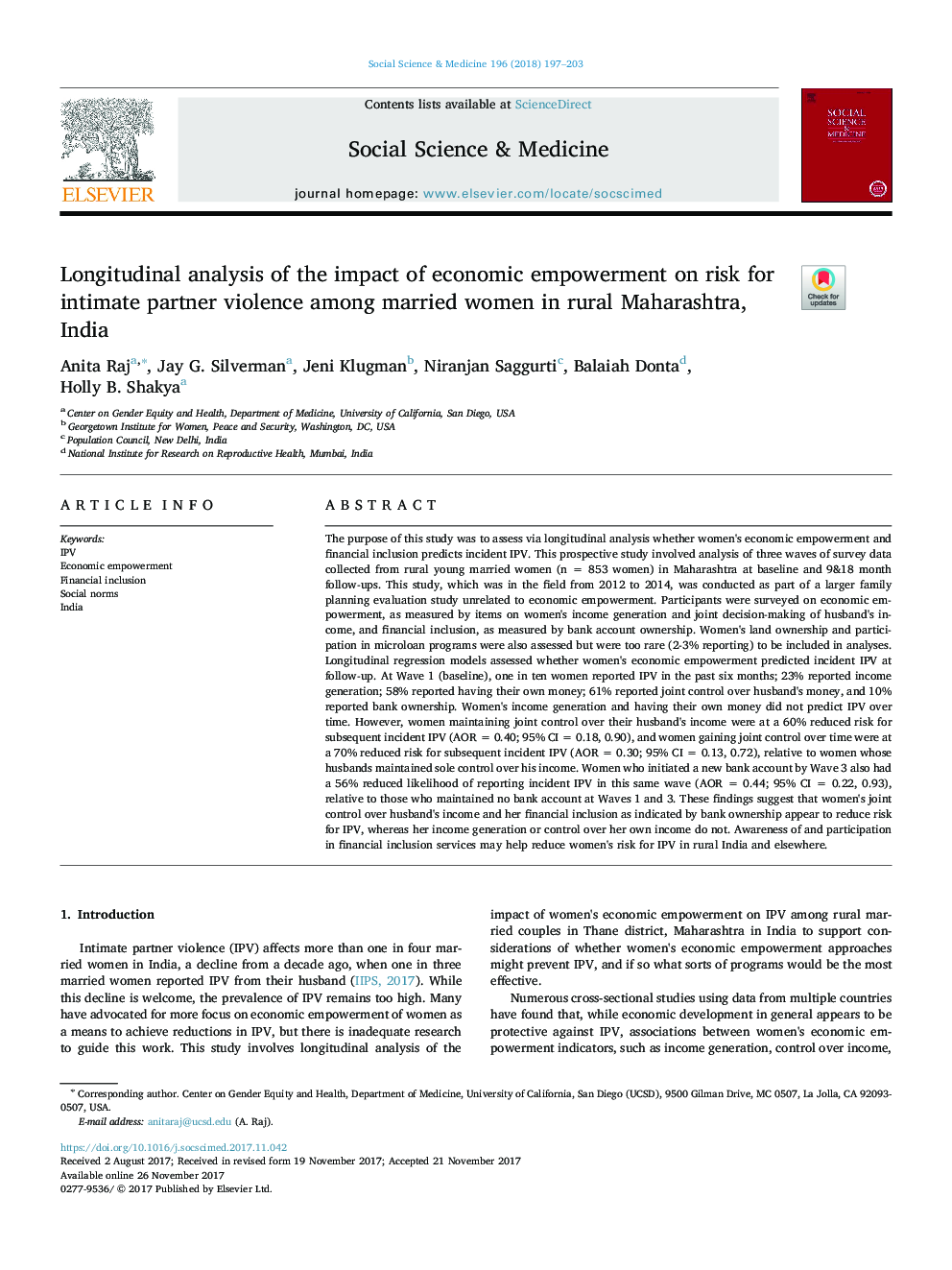| کد مقاله | کد نشریه | سال انتشار | مقاله انگلیسی | نسخه تمام متن |
|---|---|---|---|---|
| 7328910 | 1475973 | 2018 | 7 صفحه PDF | دانلود رایگان |
عنوان انگلیسی مقاله ISI
Longitudinal analysis of the impact of economic empowerment on risk for intimate partner violence among married women in rural Maharashtra, India
ترجمه فارسی عنوان
تحلیل طولی تأثیر توانمندسازی اقتصادی بر خطر خشونت شریک صمیمی در زنان متاهل در روستای مهاراشترا، هند
دانلود مقاله + سفارش ترجمه
دانلود مقاله ISI انگلیسی
رایگان برای ایرانیان
کلمات کلیدی
موضوعات مرتبط
علوم پزشکی و سلامت
پزشکی و دندانپزشکی
سیاست های بهداشت و سلامت عمومی
چکیده انگلیسی
The purpose of this study was to assess via longitudinal analysis whether women's economic empowerment and financial inclusion predicts incident IPV. This prospective study involved analysis of three waves of survey data collected from rural young married women (n = 853 women) in Maharashtra at baseline and 9&18 month follow-ups. This study, which was in the field from 2012 to 2014, was conducted as part of a larger family planning evaluation study unrelated to economic empowerment. Participants were surveyed on economic empowerment, as measured by items on women's income generation and joint decision-making of husband's income, and financial inclusion, as measured by bank account ownership. Women's land ownership and participation in microloan programs were also assessed but were too rare (2-3% reporting) to be included in analyses. Longitudinal regression models assessed whether women's economic empowerment predicted incident IPV at follow-up. At Wave 1 (baseline), one in ten women reported IPV in the past six months; 23% reported income generation; 58% reported having their own money; 61% reported joint control over husband's money, and 10% reported bank ownership. Women's income generation and having their own money did not predict IPV over time. However, women maintaining joint control over their husband's income were at a 60% reduced risk for subsequent incident IPV (AOR = 0.40; 95% CI = 0.18, 0.90), and women gaining joint control over time were at a 70% reduced risk for subsequent incident IPV (AOR = 0.30; 95% CI = 0.13, 0.72), relative to women whose husbands maintained sole control over his income. Women who initiated a new bank account by Wave 3 also had a 56% reduced likelihood of reporting incident IPV in this same wave (AOR = 0.44; 95% CI = 0.22, 0.93), relative to those who maintained no bank account at Waves 1 and 3. These findings suggest that women's joint control over husband's income and her financial inclusion as indicated by bank ownership appear to reduce risk for IPV, whereas her income generation or control over her own income do not. Awareness of and participation in financial inclusion services may help reduce women's risk for IPV in rural India and elsewhere.
ناشر
Database: Elsevier - ScienceDirect (ساینس دایرکت)
Journal: Social Science & Medicine - Volume 196, January 2018, Pages 197-203
Journal: Social Science & Medicine - Volume 196, January 2018, Pages 197-203
نویسندگان
Anita Raj, Jay G. Silverman, Jeni Klugman, Niranjan Saggurti, Balaiah Donta, Holly B. Shakya,
